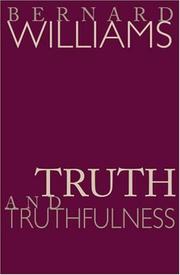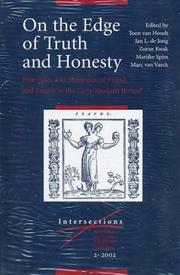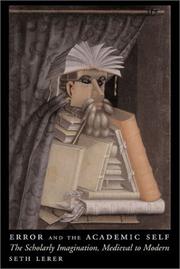| Listing 1 - 10 of 12 | << page >> |
Sort by
|

ISBN: 378871929X Year: 2002 Publisher: Neukirchen-Vluyn Neukirchener Verl.
Abstract | Keywords | Export | Availability | Bookmark
 Loading...
Loading...Choose an application
- Reference Manager
- EndNote
- RefWorks (Direct export to RefWorks)
Book
ISBN: 1282920294 9786612920295 0822383748 Year: 2002 Publisher: Durham [North Carolina] : Duke University Press,
Abstract | Keywords | Export | Availability | Bookmark
 Loading...
Loading...Choose an application
- Reference Manager
- EndNote
- RefWorks (Direct export to RefWorks)
An investigation of deceit and concealment that proposes a new theory of fiction, both as a new genre of literature and as a strategy in the social world.
Book
Abstract | Keywords | Export | Availability | Bookmark
 Loading...
Loading...Choose an application
- Reference Manager
- EndNote
- RefWorks (Direct export to RefWorks)

ISBN: 0824707907 Year: 2002 Publisher: New York (N.Y.) Dekker
Abstract | Keywords | Export | Availability | Bookmark
 Loading...
Loading...Choose an application
- Reference Manager
- EndNote
- RefWorks (Direct export to RefWorks)
Social sciences --- Truthfulness and falsehood --- Statistical methods

ISBN: 2275022309 Year: 2002 Volume: 107 Publisher: Paris : Librairie Générale de Droit et de Jurisprudence,
Abstract | Keywords | Export | Availability | Bookmark
 Loading...
Loading...Choose an application
- Reference Manager
- EndNote
- RefWorks (Direct export to RefWorks)
Truthfulness and falsehood --- Political ethics --- Mensonge --- Morale politique --- Political aspects. --- Aspect politique

ISBN: 2070424723 Year: 2002 Volume: 412 Publisher: Paris : Gallimard,
Abstract | Keywords | Export | Availability | Bookmark
 Loading...
Loading...Choose an application
- Reference Manager
- EndNote
- RefWorks (Direct export to RefWorks)

ISBN: 0691102767 0691117918 9780691117911 9780691102764 Year: 2002 Publisher: Princeton (N.J.) : Princeton university press,
Abstract | Keywords | Export | Availability | Bookmark
 Loading...
Loading...Choose an application
- Reference Manager
- EndNote
- RefWorks (Direct export to RefWorks)
What does it mean to be truthful? What role does truth play in our lives? What do we lose if we reject truthfulness? No philosopher is better suited to answer these questions than Bernard Williams. Writing with his characteristic combination of passion and elegant simplicity, he explores the value of truth and finds it to be both less and more than we might imagine. Modern culture exhibits two attitudes toward truth: suspicion of being deceived (no one wants to be fooled) and skepticism that objective truth exists at all (no one wants to be naive). This tension between a demand for truthfulness and the doubt that there is any truth to be found is not an abstract paradox. It has political consequences and signals a danger that our intellectual activities, particularly in the humanities, may tear themselves to pieces. Williams's approach, in the tradition of Nietzsche's genealogy, blends philosophy, history, and a fictional account of how the human concern with truth might have arisen. Without denying that we should worry about the contingency of much that we take for granted, he defends truth as an intellectual objective and a cultural value. He identifies two basic virtues of truth, Accuracy and Sincerity, the first of which aims at finding out the truth and the second at telling it. He describes different psychological and social forms that these virtues have taken and asks what ideas can make best sense of them today. Truth and Truthfulness presents a powerful challenge to the fashionable belief that truth has no value, but equally to the traditional faith that its value guarantees itself. Bernard Williams shows us that when we lose a sense of the value of truth, we lose a lot both politically and personally, and may well lose everything.
Credibilite --- Credibility --- Falsehood --- Geloofwaardigheid --- Insincerite --- Leugen --- Lying --- Mensonge --- Onoprechtheid --- Truth --- Truthfulness and falsehood --- Untruthfulness --- Vérité --- Vérité et mensonge --- Waarheid --- Waarheid en leugen --- Believability --- Truth. --- Truthfulness and falsehood. --- Reliability --- Honesty --- Conviction --- Belief and doubt --- Philosophy --- Skepticism --- Certainty --- Necessity (Philosophy) --- Pragmatism --- Post-truth --- #A0212W --- Philosophical anthropology --- Theory of knowledge --- genealogie --- kennisleer

ISBN: 9004125728 9004475923 Year: 2002 Volume: 2 Publisher: Leiden Boston Brill
Abstract | Keywords | Export | Availability | Bookmark
 Loading...
Loading...Choose an application
- Reference Manager
- EndNote
- RefWorks (Direct export to RefWorks)
History of civilization --- Comparative literature --- anno 1600-1699 --- anno 1500-1599 --- Deception in literature --- Deception --- Fraud --- History, Modern --- Honesty --- Truth --- Conviction --- Belief and doubt --- Philosophy --- Skepticism --- Certainty --- Necessity (Philosophy) --- Pragmatism --- Dishonesty --- Reliability --- Integrity --- Sincerity --- Truthfulness and falsehood --- World history --- Commercial fraud --- Deceit --- Misrepresentation (Crime) --- Commercial crimes --- Torts --- Hoaxes --- Impostors and imposture --- Chicanery --- Subterfuge --- Intrigue --- History --- Academic collection

ISBN: 023150747X 9780231507479 0231123728 9780231123723 0231123736 9780231123730 Year: 2002 Publisher: New York
Abstract | Keywords | Export | Availability | Bookmark
 Loading...
Loading...Choose an application
- Reference Manager
- EndNote
- RefWorks (Direct export to RefWorks)
How and why did the academic style of writing, with its emphasis on criticism and correctness, develop? Seth Lerer suggests that the answer lies in medieval and Renaissance philology and, more specifically, in mistakes. For Lerer, erring is not simply being wrong, but being errant, and this book illuminates the wanderings of exiles, émigrés, dissenters, and the socially estranged as they helped form the modern university disciplines of philology and rhetoric, literary criticism, and literary theory. Examining a diverse group that includes Thomas More, Stephen Greenblatt, George Hickes, Seamus Heaney, George Eliot, and Paul de Man, Error and the Academic Self argues that this critical abstraction from society and retreat into ivory towers allowed estranged individuals to gain both a sense of private worth and the public legitimacy of a professional identity.
English philology --- Scholarly publishing --- Errors and blunders, Literary --- English literature --- American literature --- Error --- Anachronisms, Literary --- Blunders, Literary --- Literary anachronisms --- Literary blunders --- Literary errors and blunders --- Mistakes, Literary --- Literature --- Academic publishing --- Publishers and publishing --- Germanic philology --- Belief and doubt --- Knowledge, Theory of --- Relativity --- Truth --- Truthfulness and falsehood --- History. --- History and criticism --- Theory, etc. --- Great Britain --- Intellectual life. --- Higher education --- English language

ISBN: 1402071604 9781402071607 1441953019 1475734700 Year: 2002 Publisher: Boston Kluwer Academic
Abstract | Keywords | Export | Availability | Bookmark
 Loading...
Loading...Choose an application
- Reference Manager
- EndNote
- RefWorks (Direct export to RefWorks)
economic modelling and thought. Part three presents two case studies as examples of deceptive autonomy and shows the impact of this deception on the situation of women from the viewpoint of cultural studies and social anthropology. Part four relates methodological reflections on feminist and mainstream economics to the theme of the book. The first part of this book is devoted to a reconsideration of Adam Smith as a starting point for feminist perspectives on exchange. Drawing on Adam Smith's Theory of Moral Sentiments Caroline Gerschlager sets the stage for expanding the economic concept of exchange. She analyses and develops Smith's insight that deception is inevitable in the social setting. Smith's system of sympathy, which Gerschlager analyses as a system of exchange, i.e. exchange is conceived in terms of changing places in the imagination, is compared with exchange as conceived by the neoclassical approach. Her analysis reveals that these approaches arrive at contrasting results with regard to deception. Whereas in the former deception is vital to an understanding of exchange, the latter regards deception as an inefficiency, hindering exchange and ultimately making it impossible. Gerschlager points out that a certain degree of deception is inevitable, and that living in society therefore also amounts to "deceiving and being deceived".
Economics --- Exchange --- Deception --- Feminism --- Economie politique --- Théorie de l'échange (Economie politique) --- Tromperie --- Féminisme --- Psychological aspects --- Congresses --- Aspect psychologique --- Congrès --- -Exchange --- -Deception --- #SBIB:316.346H10 --- Emancipation of women --- Feminist movement --- Women --- Women's lib --- Women's liberation --- Women's liberation movement --- Women's movement --- Social movements --- Anti-feminism --- Chicanery --- Deceit --- Subterfuge --- Truthfulness and falsehood --- Intrigue --- Commerce --- Economic anthropology --- Supply and demand --- Economic theory --- Political economy --- Social sciences --- Economic man --- Vrouwenproblematiek, feminisme: algemeen --- Emancipation --- Théorie de l'échange (Economie politique) --- Féminisme --- Congrès --- Economic history. --- Social sciences. --- History of Economic Thought/Methodology. --- Social Sciences, general. --- Behavioral sciences --- Human sciences --- Sciences, Social --- Social science --- Social studies --- Civilization --- Economic conditions --- History, Economic
| Listing 1 - 10 of 12 | << page >> |
Sort by
|

 Search
Search Feedback
Feedback About
About Help
Help News
News